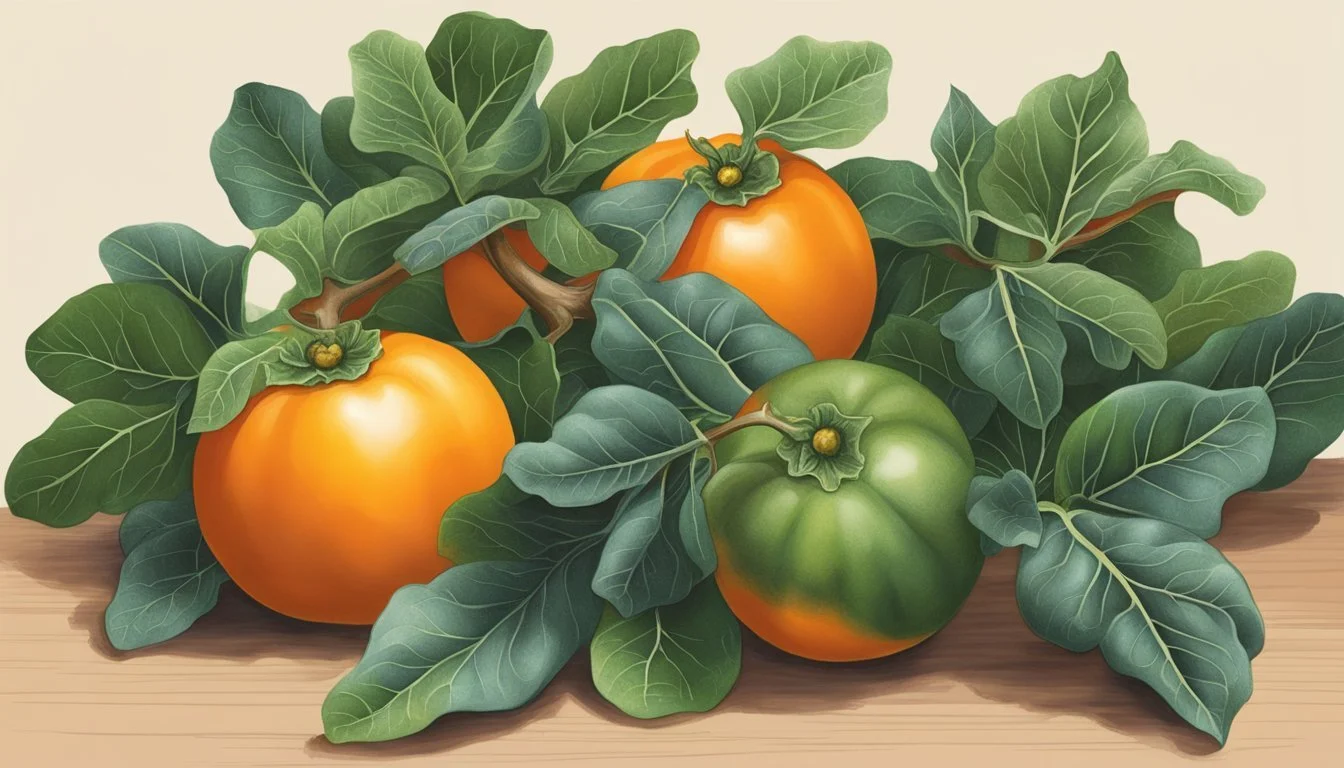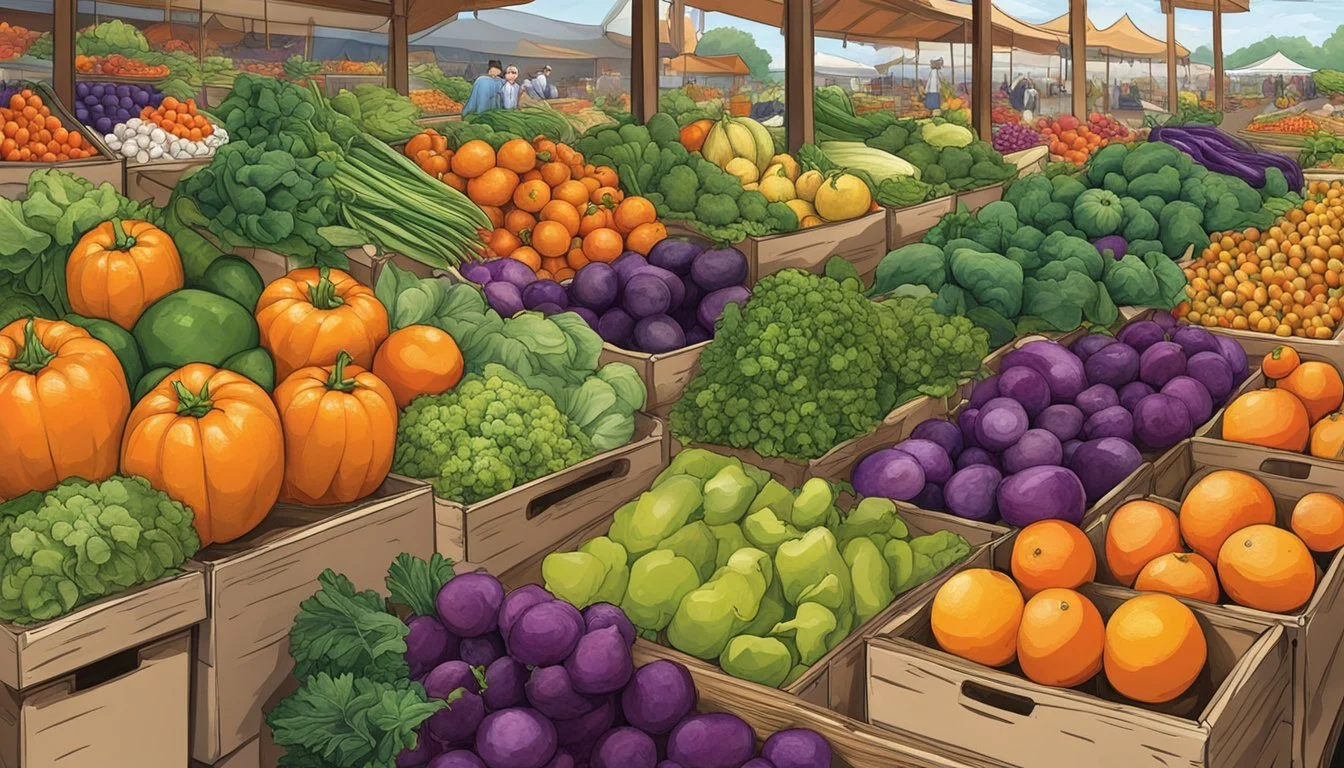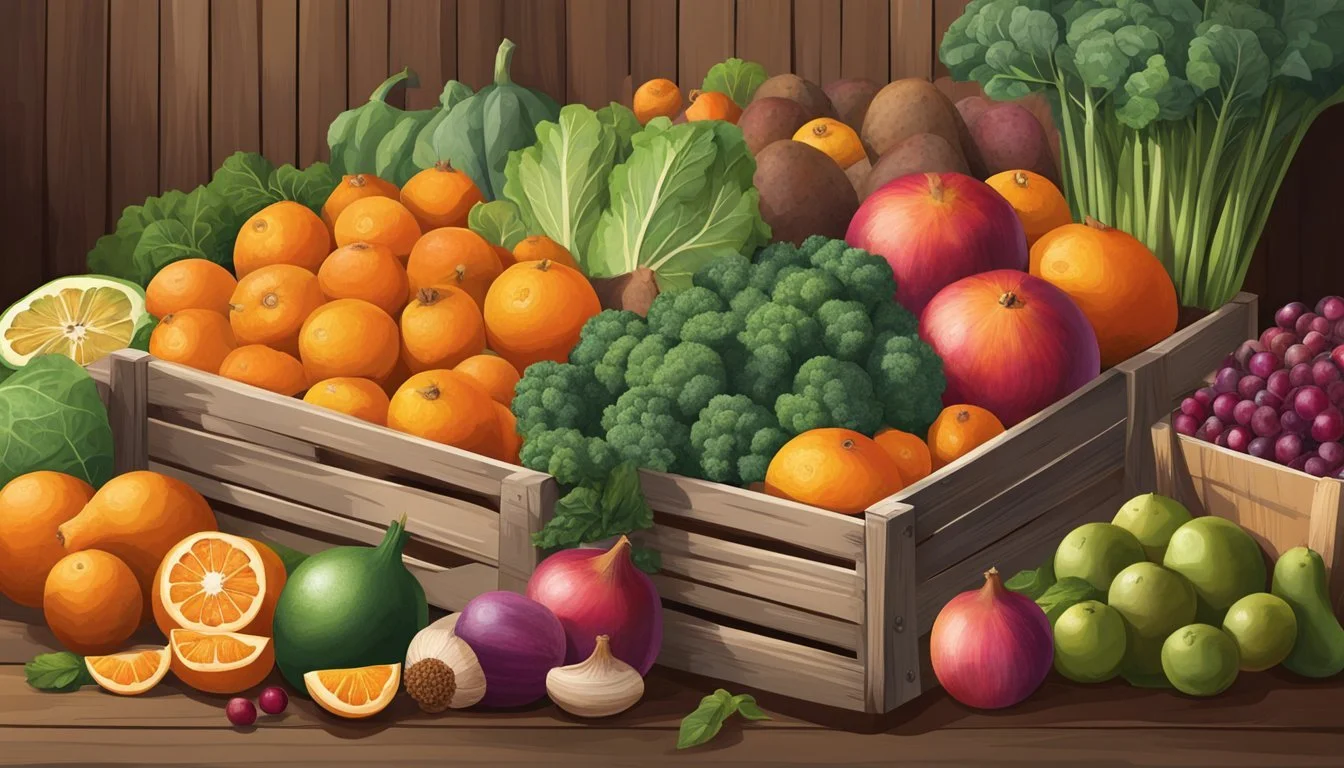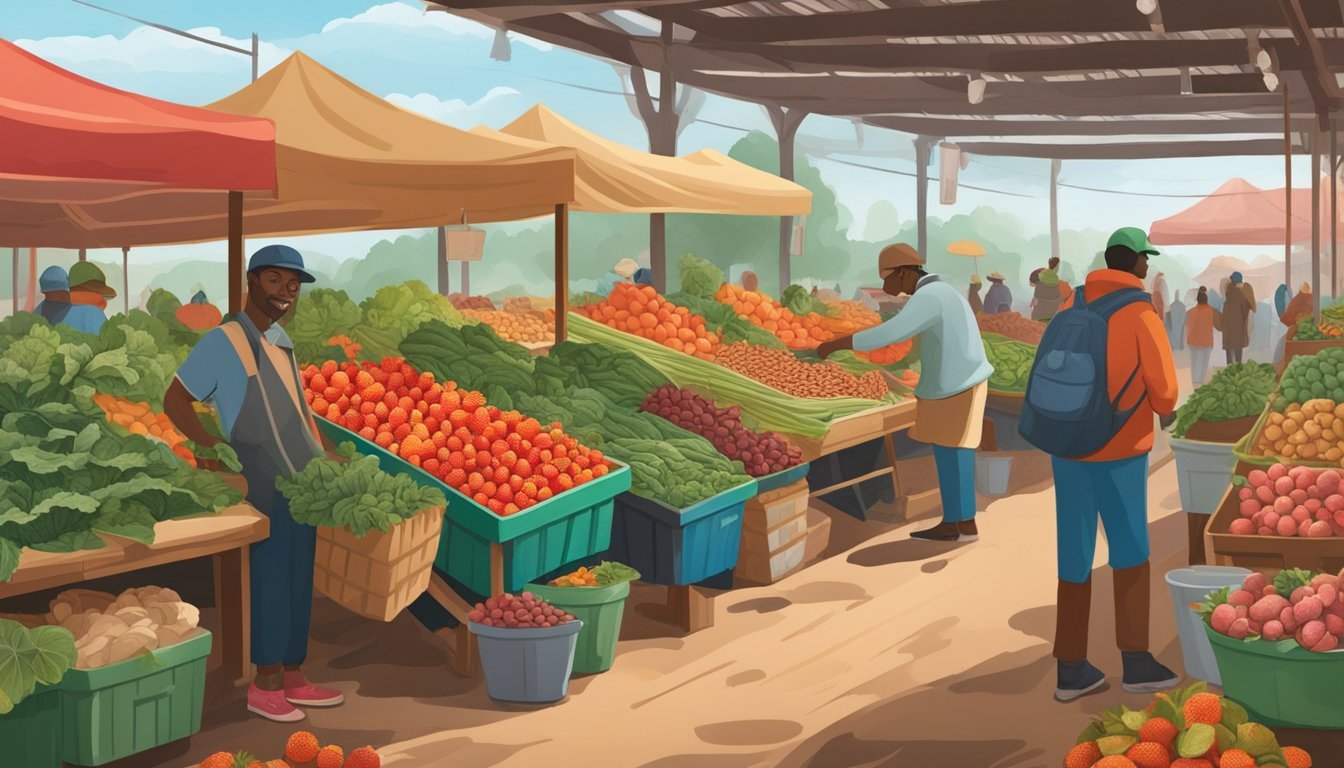South Carolina Seasonal Fruit & Vegetables in December
A Guide to Winter Produce
This Article is Part of our South Carolina Seasonal Fruit & Veg Calendar
South Carolina's temperate climate allows for a diverse range of fruits and vegetables to be grown and harvested even in the cooler months. In December, the focus shifts to hardy, cool-season crops that can withstand the lower temperatures. Residents and visitors alike have the opportunity to enjoy a selection of produce that is fresher and more flavorful due to the shorter transit times when bought locally.
The selection of seasonal produce available in December includes robust leafy greens such as collards, mustard greens, and turnip greens, each packed with nutrients and flavor, ideal for hearty stews and braises. Root vegetables like rutabagas, turnips, and radishes are also at their peak, offering a sweet, earthy element to dishes. While fruit options are more limited in December, citrus fruits begin to make an appearance, providing a bright, tangy contrast to the more substantial flavors of the season's vegetables.
Farmers' markets and local grocery stores highlight these seasonal offerings, ensuring that the produce is picked at the right time for the best taste and nutrition. Embracing these seasonal selections not only supports regional agriculture but also gives consumers a culinary experience deeply connected to South Carolina's agricultural calendar and culinary traditions.
Overview of South Carolina's Seasonal Crops
South Carolina's agricultural richness comes to light in December, with a diverse array of produce still flourishing due to its mild winter climate. This month showcases hearty winter squash and robust root vegetables that are in their prime during the cooler season.
Winter Harvest
In December, South Carolina farmers harvest a variety of winter crops that thrive in the state's cooler temperatures. Key produce includes:
Winter Squash: Varieties such as butternut, acorn, and spaghetti squash are available and offer a rich source of vitamins and minerals.
Root Vegetables: Notable for their storage longevity and nutritional value, root vegetables like beets, carrots, and sweet potatoes are abundant.
These crops are not only seasonal highlights but are also essential for winter recipes, providing depth and warmth to meals.
Importance of Seasonal Eating
Eating seasonally in South Carolina ensures that consumers enjoy produce at its peak of freshness, flavor, and nutritional value. Seasonal eating also supports the local economy and reduces the environmental impact associated with long-distance transportation of food. In December, incorporating winter squash and root vegetables into the diet can contribute to a sustainable and health-conscious lifestyle.
December's Seasonal Fruits
In December, South Carolina's markets showcase a variety of fruits, with citrus leading the charge. Apples and pears, still within their harvest season, populate the fruit stands with their crisp and sweet flavors.
Citrus Varieties
South Carolina is not typically known for a variety of citrus fruits, but select regions do offer some harvests, although limited. Clementines and oranges are among the citrus fruits that one can find during this month. They provide a juicy, sweet, and often slightly tart flavor profile, which is much appreciated during the colder days of December.
Clementines: Small, sweet, and typically seedless, making them a perfect on-the-go snack.
Oranges: Larger and juicier, these are ideal for both eating fresh or using in recipes.
Late Harvest Fruits
While not as prolific as other states, South Carolina does offer late harvest fruits such as crisp apples and succulent pears during December.
Apples: Varied types are available, ranging in flavor from sweet to tart.
Pears: These come in different varieties, offering a sweet, buttery texture.
Both apples and pears remain in season in December, continuing from their fall harvest. These fruits are versatile for cooking and baking, as well as being enjoyed fresh.
December's Seasonal Vegetables
December brings an abundance of hearty vegetables to South Carolina, each offering rich flavors and essential nutrients to winter dishes.
Leafy Greens and Cruciferous Vegetables
During December, South Carolina fields flourish with a variety of leafy greens and cruciferous vegetables. Broccoli and Brussels sprouts are at their peak, providing crisp textures and flavors ideal for both raw and cooked applications. Kale (What wine goes well with kale?) and cabbage are also readily available, delivering versatility for salads, soups, and side dishes. These greens are known for their resilience to the colder weather and their nutritional value.
Broccoli: Fresh and tender, best used in stir-fries and salads.
Brussels sprouts: Ideal for roasting and pairing with festive seasonings.
Kale: Perfect for hearty salads or as a cooked green.
Cabbage: Suited for slaws, soups, or fermented dishes like sauerkraut.
Root Vegetables and Squashes
The cool December climate in South Carolina supports a robust harvest of root vegetables and squashes. Sweet potatoes and carrots offer natural sweetness and depth to a variety of recipes, from baked dishes to comforting stews. Root vegetables like turnips provide a slightly peppery flavor and can be enjoyed roasted, mashed, or incorporated into casseroles. Winter squash varieties also make their mark during this season, adding substance and a touch of sweetness to meals.
Turnips: Great roasted or added to stews for a nuanced peppery taste.
Carrots: Versatile for both savory and sweet dishes, enjoyed roasted or glazed.
Sweet potatoes: A staple for mash or baked goods, rich in flavor and nutrients.
Winter squash: Incorporates well into soups or baked as a side dish.
Preparation and Cooking Suggestions
In December, South Carolina's cooler climate brings out the best in certain vegetables, like Brussels sprouts, broccoli, kale, and root vegetables, enhancing their flavor and texture. These seasonal ingredients can transform into delectable dishes with the right preparation and cooking techniques.
Cooking Seasonal Vegetables
Brussels Sprouts can be halved and roasted with a drizzle of olive oil and a sprinkle of salt to caramelize their outer leaves, resulting in a delightful side dish that enhances their natural sweetness. Broccoli works well in both salads and cooked dishes; it can be steamed until just tender or sautéed with garlic for a simple yet flavorful preparation.
Kale is a versatile green that can be used in salads or cooked down. For a quick side, one might chop the kale and sauté it with olive oil and garlic until wilted. To add texture and richness, tossing in pine nuts or raisins (how long do raisins last?) before serving can create a balance of flavors.
When it comes to root vegetables, such as rutabagas and parsnips, they can be roasted to bring out the depth of their earthy flavors or mashed for a comforting and hearty dish. Including a touch of cream or butter in the mashing process can enhance their natural sweetness and creamy texture.
Recipe Ideas for December Produce
Utilizing December produce, one can craft a variety of recipes:
Roasted Root Vegetables: A combination of diced rutabagas, parsnips, and carrots, tossed with olive oil, rosemary, salt, and pepper, and roasted until golden brown and tender.
Broccoli and Cheddar Soup: Puree cooked broccoli with vegetable broth, then stir in grated cheddar cheese for a creamy and comforting soup.
Kale Salad: Massage raw kale with a lemon vinaigrette, then add toasted almonds and dried cranberries (how long do dried cranberries last?) for a festive and fresh salad.
Brussels Sprouts with Balsamic Glaze: Roast Brussels sprouts until crispy and drizzle with a balsamic reduction, complementing the natural bitterness with a bit of sweetness.
Each recipe maximizes the fresh flavors of South Carolina’s December produce while being simple enough for home cooks to explore and enjoy.
Nutritional Benefits of Seasonal Produce
Eating seasonal fruits and vegetables in December, particularly in South Carolina, provides several nutritional advantages. These produce items are often at their peak in terms of flavor and nutrient density, offering a variety of essential vitamins and minerals.
Broccoli and Brussels sprouts, which thrive in cooler weather, are excellent sources of vitamin C and fiber. They support the immune system and can assist in digestion due to their high fiber content. Both vegetables are also rich in a compound known as glucosinolates, which may play a role in cancer prevention.
Vitamin C: Crucial for the repair of tissues and enzymatic production of certain neurotransmitters.
Fiber: Aids in digestive health and can contribute to blood sugar control.
Bok choy contains a variety of nutrients such as vitamins A, C, and K, plus it offers a boost of iron, an important mineral for maintaining healthy blood cells and general vitality. Additionally, the fiber in bok choy can be beneficial for maintaining a healthy digestive system.
Nutrient Benefit Vitamin A Supports vision and immune function Vitamin C Aids in tissue repair and immunity Vitamin K Important for bone health and clotting Iron Essential for healthy red blood cells
Consuming these vegetables in their season ensures that they are likely to be fresher and more nutrient-dense than out-of-season imports. Seasonal produce also tends to be more sustainable, as it requires fewer resources to grow and transport, aligning well with environmentally conscious food choices.
Where to Find Local Produce
In South Carolina, residents have multiple avenues to access fresh, seasonal produce directly from the source. Emphasizing local agriculture not only supports the state's economy, but also ensures that consumers enjoy fruits and vegetables at peak freshness.
Farmers' Markets and Groceries
Farmers' markets across South Carolina offer a vibrant selection of local produce. Shoppers can find a comprehensive array of fruits and vegetables, with the selection varying by season. Certified Roadside Markets and community-based farmers' markets are prime spots for sourcing what's in season. For example, visiting a market in December could yield finds such as leafy greens and root vegetables. Additionally, many grocery stores in the area boast sections dedicated to Certified South Carolina Grown items, connecting consumers to local agricultural products even in a more conventional shopping setting.
Community-Supported Agriculture (CSA)
Community-Supported Agriculture (CSA) programs represent a commitment between local farmers and community members. Participants receive a portion of the season's harvest, typically distributed weekly. This direct line to fresh, local produce ensures that South Carolina residents have access to the best of the season's offerings. To join a CSA, interested individuals can look into options such as Certified South Carolina Grown Members or explore agritourism farms that may provide subscription services. These programs strengthen the bond between producers and consumers and promote sustainability within the local food system.
Preservation and Storage Techniques
Proper preservation and storage are vital for extending the life of South Carolina's seasonal fruits and vegetables in December. It is important to manage the environment in which produce is stored to maintain quality and flavor.
For Vegetables:
Root Vegetables such as carrots:
Storage: Store in a cool, humid place. If unavailable, place them in plastic bags with some air holes and refrigerate.
Preservation: Can be canned or pickled and kept for extended periods.
Cruciferous Vegetables like broccoli and cauliflower:
Storage: Keep in the refrigerator's crisper drawer. They prefer a cold and slightly humid environment.
Preservation: Blanch and freeze or prepare pickles.
Leafy Greens such as bok choy:
Storage: Refrigerate in a plastic bag with a paper towel to absorb excess moisture.
Preservation: Can be blanched and frozen for several months.
For Fruits:
No December-specific fruits are named in the current data set, so broader advice will be given.
Most fruits should be kept at room temperature initially until ripe. Once ripeness is achieved, they can be refrigerated to slow down decay.
Preservation: Fruits can often be frozen, dried, or canned, which is ideal for raw consumption later or use in cooked dishes.
For all produce:
Ensure to clean and dry produce before storage to reduce the risk of spoilage.
Raw consumption is best when fruits and vegetables are at their peak freshness.
By applying these storage and preservation techniques, consumers can enjoy South Carolina's seasonal produce well beyond its harvest.
Seasonal Eating and Sustainability
In South Carolina, seasonal eating is particularly beneficial during December when a variety of fruits and vegetables reach their peak. Consuming seasonal produce is a practice that supports sustainability for several reasons.
Firstly, local produce reduces transportation distances, which leads to a lower carbon footprint. Vegetables such as broccoli and cabbage are harvested in South Carolina during December, providing consumers with fresh options that haven't traveled far.
Seasonal fruits like cranberries and vegetables including Brussels sprouts not only travel shorter distances but also require less storage, further conserving energy. Here is a brief list of fruits and vegetables typically available in December in South Carolina:
Broccoli
Cabbage
Brussels Sprouts
Cranberries
Sourcing locally not only supports the region's farmers but also contributes to the preservation of regional agricultural land. By choosing to eat seasonally, consumers help in maintaining the economic and environmental health of South Carolina.
Additionally, seasonal fruits and vegetables tend to be more nutrient-dense. Without the need for long-term storage, produce is fresher and often richer in vitamins and minerals. This practice aligns with sustainable living by promoting healthful eating and reducing the need for processed foods, which often have a larger environmental impact in terms of production and packaging.
Lastly, seasonal eating often incurs lower costs. Items in season are abundantly available, which typically drives market prices down. This offers both an economic incentive for consumers and helps farmers move their produce swiftly, reducing potential waste.
Emphasizing seasonal eating is a step towards a sustainable future, with South Carolina offering a variety of produce in December that supports this goal.
Conclusion
South Carolina's temperate climate allows for a variety of fruits and vegetables to be available year-round. In December, Brussels sprouts and cabbage flourish. These cruciferous vegetables benefit from the cooler air, enhancing their taste.
Citrus fruits, though not native, are often associated with winter months and are likely present in markets due to South Carolina's accommodating weather. While specific harvest times can vary, there's a general expectation for these to be accessible in this period.
Residents and visitors can enjoy the following produce during December:
Brussels Sprouts: Harvested from November through February.
Cabbages: Enjoyed best from October through May.
The advantage for consumers is consistent access to fresh, nutritious produce crucial for a balanced diet. The notion of year-round consumption is quite achievable in regions like South Carolina, where agricultural practices and regional climates enable a continuous supply of fresh fruits and vegetables.
Moreover, consumption of these seasonal offerings supports local agriculture, promotes sustainability, and provides an economic boost to farmers within the state. Choosing seasonal and local produce ensures fresher, more flavorful, and nutrient-dense options, reflecting South Carolina's rich agricultural heritage.









